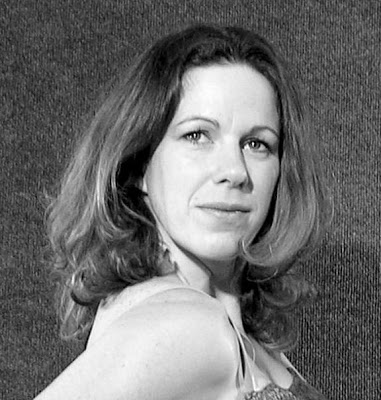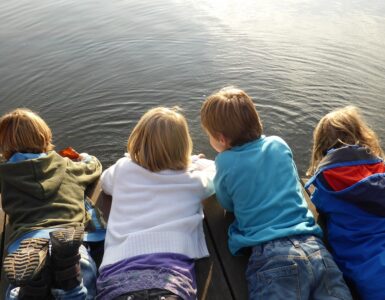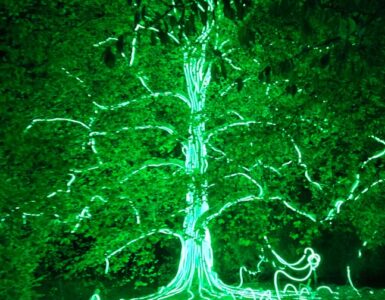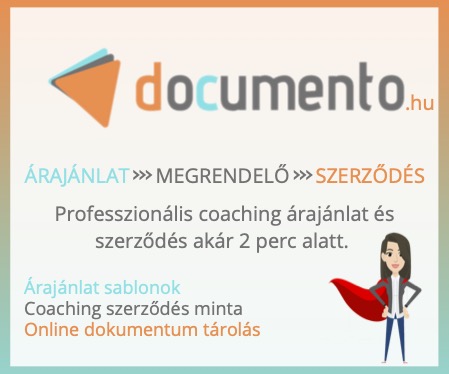Leni De Goeyse Lean Coach, Trainer-Advisor Personal & Talent Development at KBC Bank in Belgium. We met when she worked in Budapest two years ago, and I had the privilege of experiencing her extremely colorful and complex way of work and methodology listing several creative tools and approaches.Her specific area of coaching and training currently is ‘Coping with change’ and ‘Innovative/Creative Thinking’. According to feedbacks from the participants of her trainings, coaching clients Leni is described as: Dynamic (enter)trainer, Motivational speaker, Creative event planner, Workshop facilitator, Decorator, Storyteller, Think-tank.
I always admired how she finds the perfect portions, a unique balance of all the things she incorporates in her work…

MC: How do you define balance – in life and in professional life?
LDG: In life in general, I believe balance is about being happy with who you are. It is about truly accepting who you are,with all your restrictions and talents, in your heart and in your mind. Often we know it is ok to be who we are but we don’t feel it that way or we feel or want certain things and we want to understand why we feel or want these things. People are often searching for who they are or what they want to be. Balance is stop looking and accepting. I do not mean we cannot seek new things that may make us stronger but I mean that balance is loving the core of who we are. In a relationship we look for someone to complete us or at least that is what we say or think. I believe we look for a relationship in which we feel good to love ourselves and be ourselves.
LDG: In a professional life it is more or less the same. We look for a job where we can fully use our potential and talents, if we cannot, we feel lost. So when we have job that is challenging but not demanding large amounts of efforts we are in balance. Turning your hobby into your job. Some of us are able to do that, most of us not due to several reasons but nothing stops us from finding a position or role in which we can shine with our talents. A job in which people compliment us on our performance, which we see as just doing what we like.
LDG: But our private lives and our professional lives can balance each other. Not all our talents are relevant within our professional life but we can use them in our private life.
MC: Where do you see its importance?
LDG: Close your eyes and imagine an equilibrist walking on a tight rope spun above a canyon. To lose his/her balance may be losing his/her life. If we do not find that balance in our lives we may lose, maybe not our lives but who we are. No being able to be who we are will make us unhappy. An equilibrist will balance the long stick, tilt it more to the left or to the right, to make sure he/she stays firmly on the rope (although to us bystanders it may seem they do it ever so lightly)
MC: What are the benefits if one has it?
LDG: We are truly happy and others notice
LDG: Balance gives us more room for creativity. It opens the windows of the mind.
LDG: Being in balance reduces anxiety and stress because you accept change and because you are more creative it will help you to go through that change
MC: Or the dangers of one losing it?
LDG: Anger, depression, insecurity, frustration, ….
MC:How / where /when did you find your own balance?
LDG: That happened in a relationship a pretty long time ago, shortly before I left that person. For years I had tried to please him and be wanted he wanted me to be. A certain moment it struck me I could never be want he wanted me to be but even more, I didn’t want to be that person. Taking the step of leaving and starting making decisions based on what I wanted was scary and confusing at first. Even the little things like ‘Do I want ice cream or not? And if I do, what flavour?’ It sounds ridiculous but that was the way it was. I started writing and listening more to my gut-feeling. I sang in my shower, I cooked, I painted… I learned to use all of my senses to discover what I liked and what made me happy. I discovered what I was good at. I learned to say ‘no’ when something didn’t feel right and I learned to say goodbye to beautiful people when I felt I was losing myself. I accepted that I needed to balance that stick on my rope in order to keep my own balance in life.
MC: What are the ways of maintaining it?
LDG: I believe it is Alice (of Alice in Wonderland) who says “Sometimes I believe in as many as six impossible things before breakfast.” You can think of 6 crazy things, or you can touch 6 different items, just to feel what they feel like, sing 6 different song while taking a shower or cooking breakfast to hear different tones and words, taste 6 different flavours during breakfast. Also during the day I do this. At moments truly listen, feel, taste, touch … It inspires me.
MC: How can you work on / with balance?
LDG: I found out that coaching people to help them find their balance helps me balance myself
LDG: Like I described before this balance (being happy) can be found on a physical and mental level. (singing, writing, joking, sports, massage, painting)
MC: How do you incorporate it in your coach work / trainings?
LDG: Next to the traditional coaching (appreciative inquiry) I like to work with three pillars of senses: 1. Relaxation: breathing, listening, getting massage and giving massage, touching 2. Movement: feel underground, listen, move freely, sing 3. Creativity: paint, see, draw, touch, create ….
MC: Especially when it comes to creative methods and tools?
LDG: In my third pillar you can go absolutely crazy when it comes to the use of materials, it could be anything. There are no restrictions but the ones the people believe in. In every pillar we work on finding ‘a way’, accepting and being happy with it.
MC: What’s the beneficial of your approach for participants?
LDG: Coaching isn’t a one size fits all. Finding balance is a personal thing, it needs a personal approach. Some people find peace, happiness and a part of themselves through movement (ex. Dancing), others through silence and/or touch and being touched (massage) and others have of failing when creating something so in the creative pillar we ‘create’ and the result is about taking the step and not always wanting things to be perfect or in a certain manner. Some people (like myself) will find benefits within all three pillars. The most important is the effort, the work we invest in finding, creating our own balance!
MC: Thank You for your answers on behalf of our readers!





















